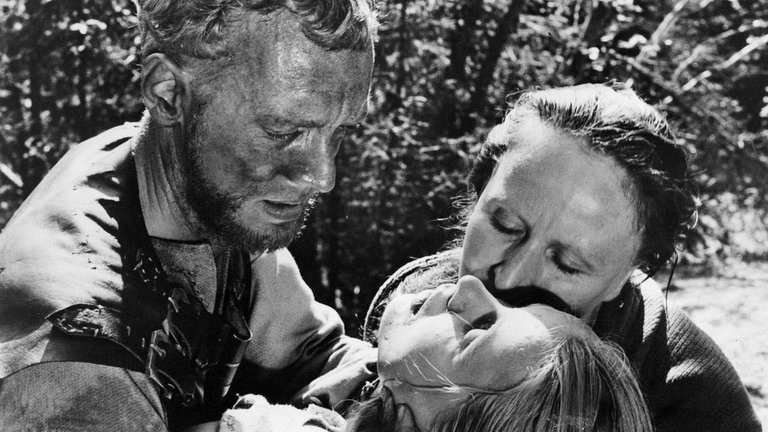Film Review: The Virgin Spring (Jungfrukällan, 1960)

Snobbish critics and cinephiles who see art films as the only true films are likely to perceive Ingmar Bergman as the antithesis of everything that is commercial in cinema. However, particularly in the early stages of his career, Bergman created films that were, directly or indirectly, associated with the burgeoning realm of exploitation cinema. A prime example is his 1960 period drama The Virgin Spring, a work that inadvertently laid the groundwork for an entire genre of exploitation films.
The Virgin Spring is loosely adapted from the Swedish folk ballad Töres döttrar i Wänge (“Töre’s Daughters in Wänge”), which retells the tragic events leading to the construction of a church in Kärna during the 12th century. The plot is set in medieval Sweden, centring on Töre (played by Max von Sydow), a prosperous farmer, husband to devoutly Christian wife Marëta (played by Birgitta Valberg), and proud father of beautiful 15-year-old daughter Karin (played by Birgitta Pettersson). Töre sends Karin to deliver candles to the church, a task requiring a day’s journey, during which she is accompanied by Ingeri (played by Gunnel Lindblom), a pregnant maidservant who, ostracised over her and her unborn child’s illegitimacy, secretly worships the Norse pagan god Odin. When they come to a dark and ominous forest, Ingeri abandons Karin out of fear, leaving Karin to confidently continue alone before she becomes the target of two herdsmen (played by Axel Düberg and Tor Isendal) and their young brother (played by Ove Porat). They rape, murder, and rob the girl and later, not knowing whose daughter she was, appear at Töre’s estate where they are generously treated with food and shelter. It is only when they try to sell Karin’s possessions to Marëta that she realises what has happened to her missing daughter. She tells Töre, who promptly decides to exact swift and brutal retribution on Karin’s murderers.
Three years prior to The Virgin Spring, Bergman released The Seventh Seal, his most iconic film, which also catapulted him into international acclaim. However, Bergman wasn’t completely satisfied with it or, at least, he tried to prevent criticisms over depictions of medieval Sweden. To address these concerns, he enlisted Ulla Isaksson—an accomplished novelist known for her historical accuracy—to refine the screenplay for The Virgin Spring. This collaboration aimed to imbue the story with authenticity while simplifying its structure.
Bergman's meticulous attention to period detail is evident throughout The Virgin Spring. He dedicates considerable screen time to establishing seemingly mundane aspects of daily life in medieval Sweden. This deliberate pacing results in a film that feels longer than its 90-minute runtime would suggest.
One striking aspect of The Virgin Spring is its treatment of violence. The absence of a musical score during pivotal scenes amplifies their impact, rendering them profoundly unsettling. Critics who had previously revered Bergman's work found themselves at odds with this film due to its unflinching portrayal of brutality. While the violence may not be graphically explicit by contemporary standards, its drawn-out execution forces audiences to confront their discomfort head-on, both during the assault on Karin and Töre's subsequent acts of revenge.
The subplot involving Ingeri adds another layer of complexity, with Isaksson's script attempting to deal with the intricate relationship between Christianity and paganism in medieval Sweden. This is signalled by the sharp contrast between blonde, angelic virgin Karin and dark-haired, dishevelled Ingeri, who is also dirty both literally and figuratively. The intricacies of this subplot may elude viewers unfamiliar with Nordic traditions and also contribute to the impression of The Virgin Spring being slightly overlong.
Bergman's direction shines through the film. He elicits powerful performances from his cast, particularly from Max von Sydow as Töre. Von Sydow's portrayal captures a father's anguish transformed into wrath, making his character's descent into violence as well as subsequent remorse both compelling and tragic. Birgitta Pettersson’s performance as Karin represents one of her most significant roles of her career.
Upon its release, The Virgin Spring faced controversy due to its depiction of sexual violence but ultimately achieved commercial success, particularly in Bergman’s native Sweden. Its influence extended far beyond its initial reception; twelve years later, it inspired Wes Craven's The Last House on the Left, a dark low-budget thriller that used Bergman’s plot within a modern-day setting. This adaptation marked a pivotal moment in cinema history by giving rise to what would become known as the "rape and revenge" genre.
While The Virgin Spring may not be as well-known as some of Bergman's other works, it is a powerful and thought-provoking film that deserves recognition for its contributions to cinema.
RATING: 6/10 (++)
Blog in Croatian https://draxblog.com
Blog in English https://draxreview.wordpress.com/
InLeo blog https://inleo.io/@drax.leo
Hiveonboard: https://hiveonboard.com?ref=drax
Rising Star game: https://www.risingstargame.com?referrer=drax
1Inch: https://1inch.exchange/#/r/0x83823d8CCB74F828148258BB4457642124b1328e
BTC donations: 1EWxiMiP6iiG9rger3NuUSd6HByaxQWafG
ETH donations: 0xB305F144323b99e6f8b1d66f5D7DE78B498C32A7
BCH donations: qpvxw0jax79lhmvlgcldkzpqanf03r9cjv8y6gtmk9
Posted Using InLeo Alpha